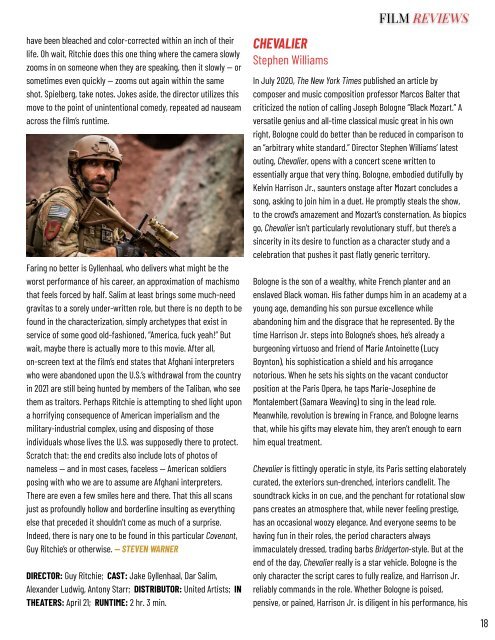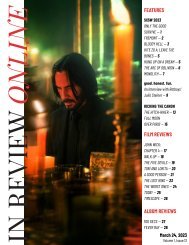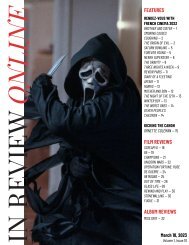InRO Weekly — Volume 1, Issue 16
You also want an ePaper? Increase the reach of your titles
YUMPU automatically turns print PDFs into web optimized ePapers that Google loves.
FILM REVIEWS<br />
have been bleached and color-corrected within an inch of their<br />
life. Oh wait, Ritchie does this one thing where the camera slowly<br />
zooms in on someone when they are speaking, then it slowly <strong>—</strong> or<br />
sometimes even quickly <strong>—</strong> zooms out again within the same<br />
shot. Spielberg, take notes. Jokes aside, the director utilizes this<br />
move to the point of unintentional comedy, repeated ad nauseam<br />
across the film’s runtime.<br />
Faring no better is Gyllenhaal, who delivers what might be the<br />
worst performance of his career, an approximation of machismo<br />
that feels forced by half. Salim at least brings some much-need<br />
gravitas to a sorely under-written role, but there is no depth to be<br />
found in the characterization, simply archetypes that exist in<br />
service of some good old-fashioned, “America, fuck yeah!” But<br />
wait, maybe there is actually more to this movie. After all,<br />
on-screen text at the film’s end states that Afghani interpreters<br />
who were abandoned upon the U.S.’s withdrawal from the country<br />
in 2021 are still being hunted by members of the Taliban, who see<br />
them as traitors. Perhaps Ritchie is attempting to shed light upon<br />
a horrifying consequence of American imperialism and the<br />
military-industrial complex, using and disposing of those<br />
individuals whose lives the U.S. was supposedly there to protect.<br />
Scratch that: the end credits also include lots of photos of<br />
nameless <strong>—</strong> and in most cases, faceless <strong>—</strong> American soldiers<br />
posing with who we are to assume are Afghani interpreters.<br />
There are even a few smiles here and there. That this all scans<br />
just as profoundly hollow and borderline insulting as everything<br />
else that preceded it shouldn’t come as much of a surprise.<br />
Indeed, there is nary one to be found in this particular Covenant,<br />
Guy Ritchie’s or otherwise. <strong>—</strong> STEVEN WARNER<br />
DIRECTOR: Guy Ritchie; CAST: Jake Gyllenhaal, Dar Salim,<br />
Alexander Ludwig, Antony Starr; DISTRIBUTOR: United Artists; IN<br />
THEATERS: April 21; RUNTIME: 2 hr. 3 min.<br />
CHEVALIER<br />
Stephen Williams<br />
In July 2020, The New York Times published an article by<br />
composer and music composition professor Marcos Balter that<br />
criticized the notion of calling Joseph Bologne “Black Mozart.” A<br />
versatile genius and all-time classical music great in his own<br />
right, Bologne could do better than be reduced in comparison to<br />
an “arbitrary white standard.” Director Stephen Williams’ latest<br />
outing, Chevalier, opens with a concert scene written to<br />
essentially argue that very thing. Bologne, embodied dutifully by<br />
Kelvin Harrison Jr., saunters onstage after Mozart concludes a<br />
song, asking to join him in a duet. He promptly steals the show,<br />
to the crowd’s amazement and Mozart’s consternation. As biopics<br />
go, Chevalier isn’t particularly revolutionary stuff, but there’s a<br />
sincerity in its desire to function as a character study and a<br />
celebration that pushes it past flatly generic territory.<br />
Bologne is the son of a wealthy, white French planter and an<br />
enslaved Black woman. His father dumps him in an academy at a<br />
young age, demanding his son pursue excellence while<br />
abandoning him and the disgrace that he represented. By the<br />
time Harrison Jr. steps into Bologne’s shoes, he’s already a<br />
burgeoning virtuoso and friend of Marie Antoinette (Lucy<br />
Boynton), his sophistication a shield and his arrogance<br />
notorious. When he sets his sights on the vacant conductor<br />
position at the Paris Opera, he taps Marie-Josephine de<br />
Montalembert (Samara Weaving) to sing in the lead role.<br />
Meanwhile, revolution is brewing in France, and Bologne learns<br />
that, while his gifts may elevate him, they aren’t enough to earn<br />
him equal treatment.<br />
Chevalier is fittingly operatic in style, its Paris setting elaborately<br />
curated, the exteriors sun-drenched, interiors candlelit. The<br />
soundtrack kicks in on cue, and the penchant for rotational slow<br />
pans creates an atmosphere that, while never feeling prestige,<br />
has an occasional woozy elegance. And everyone seems to be<br />
having fun in their roles, the period characters always<br />
immaculately dressed, trading barbs Bridgerton-style. But at the<br />
end of the day, Chevalier really is a star vehicle. Bologne is the<br />
only character the script cares to fully realize, and Harrison Jr.<br />
reliably commands in the role. Whether Bologne is poised,<br />
pensive, or pained, Harrison Jr. is diligent in his performance, his<br />
18
















